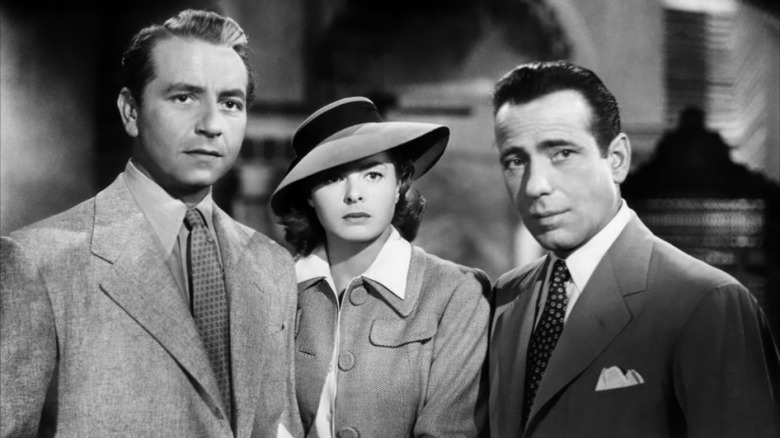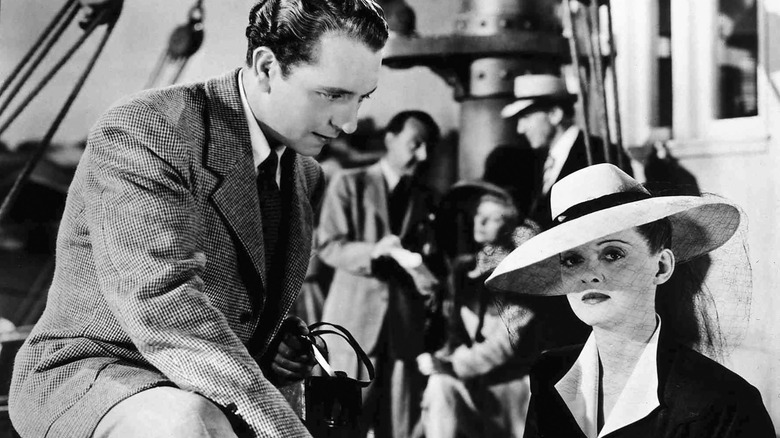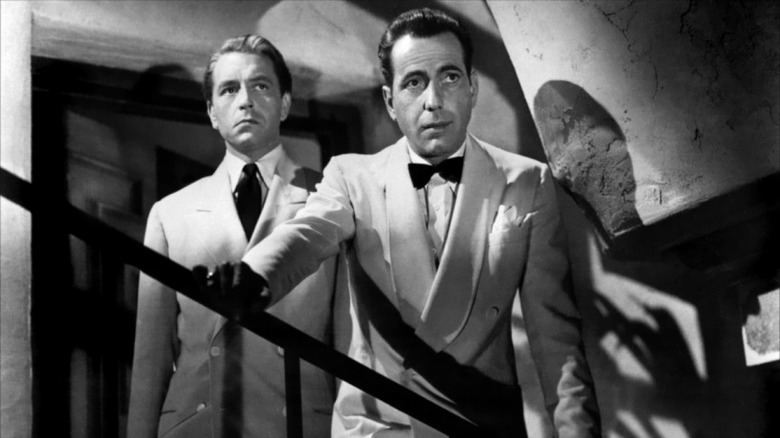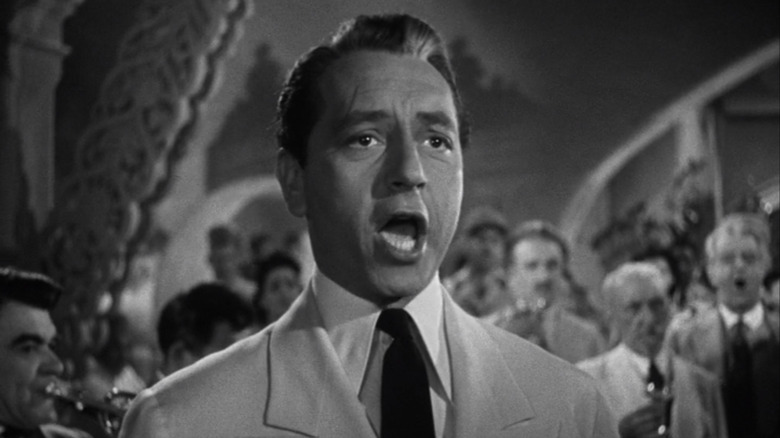Why Paul Henreid's Supporting Role In Casablanca Is So Important To The Movie
The electric chemistry between Rick and Ilsa in "Casablanca" is the stuff of cinematic legend. Thanks to the lead performances from Humphrey Bogart and Ingrid Bergman, the 1943 romantic drama is remembered as a gem of classic Hollywood, its reputation only growing in the 80 years since its initial release. But although the two leads deserve a lion's share of the credit for the success of the film, the devastating love triangle could never have been carried off half as well without the efforts of its third wheel, Victor Laszlo, played by Paul Henreid. An Austrian-born actor who took Hollywood by storm in the early 1940s, his contributions to the role give it an essential sense of balance — without his commanding presence, the entire romantic equilibrium would be thrown out of whack.
Convincing a leading man to take a supporting role
Getting Paul Henreid to take on the role of Victor Laszlo was no small thing. The year before, Henreid took American audiences by storm with his smoldering performance in "Now Voyager" opposite Bette Davis. In it, he plays a charming yet regrettably married architect who meets and falls in love with Davis' Charlotte Vale while the two are on a cruise together. With this role (and in particular the way he sensually lights two cigarettes in his mouth at the same time, passing one to Charlotte), he cemented himself as a leading man on the rise.
But this newfound status meant that he might be reluctant to take on the role of Laszlo, a secondary character and one whose wife is in love with another man (via "We'll Always Have Casablanca" by Noah Isenberg). In the end, there's a narrative compromise. Although Ilsa's heart may be with Rick, the fact that she does leave with Victor allowed Henreid to take on the role without sacrificing his public image. In addition, his character's unimpeachable morality in fighting against the Nazis likely appealed to Henreid, who had fled Germany in the late 1930s as an avowed anti-Nazi and officially designated "enemy of the Third Reich."
Building the character of Victor Laszlo
As we see, the process of casting Henreid in "Casablanca" was certainly a delicate matter. But once he was in the role, the careful negotiations continued, as he built his character on a razor's edge. The biggest potential problem with "Casablanca" is that it's a romance — we have to buy the relationship between Rick and Ilsa, we have to buy into their grand romance. But we also have to believe in the power of Victor Laszlo, a Czech resistance fighter who spent time in a concentration camp and devoted his life to the defeat of the Third Reich. He has to seem like a great enough guy that Ilsa is willing to leave with him, abandoning Rick in the process.
And what's more, we the audience have to like him enough as a character to not have this plot element ruin the ending of the film for us. We can be sad that Rick and Ilsa don't end up together, but the movie doesn't work if we're angry at the fact that they leave together — it's meant to create a bittersweet feeling, because although their love is clear, it's also obvious that Ilsa and Victor have a different kind of love, one that comes with history and mutual respect. So much of that depends on Henreid's interpretation of the character. And that's a lot to put on any actor.
La Marseillaise
Although the final sequence of "Casablanca" puts a neat little bow on the love triangle, its fate is determined during the classic "La Marseillaise" scene earlier in the film. In it, a group of Nazi soldiers gather around the piano at Rick's Cafe Americain for a full-throated rendition of "Die Wacht am Rhein," a patriotic German song, much to the distaste of the other patrons. With a steely-eyed fury, Laszlo promptly begins singing the French national anthem, La Marseillaise, encouraging Rick's band to play and the rest of the assembled refugees to defiantly sing along with them. Before long, they have completely drowned out the German soldiers — a small but emotionally powerful victory. It's also a sequence that provides insight into the relationship between Laszlo and Ilsa, thanks to the strong performances from both.
He walks purposefully towards the band, stepping in smoothly to take charge of the situation, even though this is Rick's bar and thus his problem to handle. Rick gives a nod for the band to follow Laszlo, which serves as both a tacit acknowledgment of Rick's politics as well as an indication of the ultimate trajectory of this love triangle. As Ilsa watches Laszlo in this moment, eyes shining and face beaming, it's like she's looking into the sun. She and Rick are the star-crossed lovers of this piece, but her feelings for Laszlo, full of pride and admiration and love, are equally undeniable. There is a reason she fell in love with this man, and a reason she gets on the plane with him. None of that would land without Henreid's performance, which is charming and commanding without stepping on the toes of the lead romantic duo.
"Casablanca" couldn't exist without the very specific energies of Humphrey Bogart and Ingrid Bergman – their romance is what has captivated audiences for 80 years, after all. But it also owes a massive debt of gratitude to its strong supporting performances from a large ensemble cast. Peter Lorre, Conrad Veidt, even the extras who play stranded refugees all bring something special and unique to the proceedings. But it's fair to say that no one in "Casablanca" was operating in a more tenuous position than Paul Henreid as Victor Laszlo, walking a tightrope upon which a misstep either way could have sent the film crashing down.



